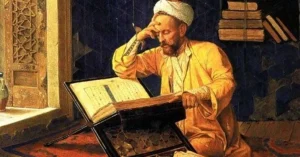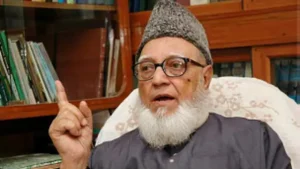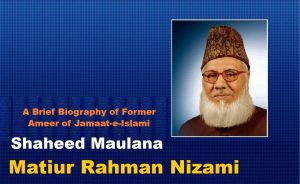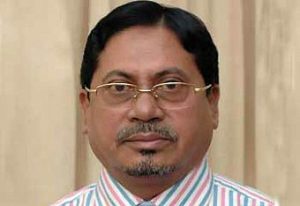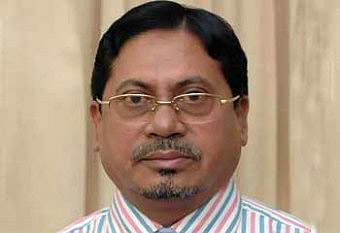
Mohammad Kamaruzzaman
A Symbolic Elimination
Kamaruzzaman’s position as a senior leader of Jamaat-e-Islami made him a symbolic target. The ruling regime, having declared a mission to “uproot” Jamaat, saw in him a man whose ideological firmness, popularity among the youth, and unshakable moral stance posed a challenge to their authority. His elimination through judicial means served the dual purpose of silencing dissent and sending a message to others within the Islamic movement.
Despite public appeals and international calls for clemency, the government rushed the execution without addressing legal ambiguities or reopening the trial in light of new evidence.
His Final Message and Martyrdom
In the final hours of his life, Kamaruzzaman refused to seek a presidential pardon, stating that he would never admit guilt for crimes he did not commit. Calm and composed, he reportedly spent his last moments in prayer, reciting the Qur’an, and embracing the ultimate sacrifice with dignity.
He was hanged at Dhaka Central Jail at 10:30 PM. His execution, while intended to break the spirit of Islamic leadership in the country, instead immortalized him as a martyr, galvanizing supporters and reaffirming their commitment to the values he upheld.
The Case, Trial, and Criticism
The arrest, prosecution, and eventual execution of Shahid Muhammad Kamaruzzaman Khan remain among the most controversial legal and political events in modern Bangladeshi history. Though presented as part of a national reckoning with the crimes of the 1971 Liberation War, many believe that his trial was less about justice and more about political retribution. This chapter aims to explore the background of the case, the legal proceedings, and the widespread national and international criticism it provoked.
Background and Arrest
Muhammad Kamaruzzaman was arrested on 13 July 2010 under the authority of the International Crimes Tribunal (ICT), a domestic war crimes tribunal established by the Government of Bangladesh in 2009 to try those accused of crimes against humanity during the 1971 war.
At the time of his arrest, Kamaruzzaman was serving as Assistant Secretary General of Bangladesh Jamaat-e-Islami and was known for his eloquence, organizational leadership, and ideological clarity. His sudden detention without formal charges for several months raised early concerns about the transparency and intent of the tribunal
.
Charges Brought Against Him
In 2011, formal charges were filed against Kamaruzzaman. He was accused of seven counts of war crimes, including:
- Planning and participating in mass killings
- Complicity in genocide (specifically related to the Sohagpur Massacre)
- Abduction, torture, and crimes against humanity in various regions of greater Mymensingh
Read the biography of Matiur Rahman Nizami >>>
These accusations were allegedly tied to his role as a student leader during 1971. However, no verifiable records or legal proceedings in the immediate aftermath of the war ever implicated him in such acts.
The Trial Process
Kamaruzzaman’s trial took place in ICT-2, one of the two chambers of the tribunal. From the outset, the legal process was plagued with irregularities:
- Defense lawyers were denied adequate time and resources to prepare their case.
- Several key defense witnesses were either intimidated or barred from testifying.
- Hearsay evidence and witness inconsistencies were admitted, raising serious concerns about the burden of proof.
- Allegations arose that some witness testimonies had been scripted, coached, or politically influenced.
Despite these concerns, the tribunal convicted Kamaruzzaman on five of the seven charges and sentenced him to death by hanging on 9 May 2013.
His lawyers appealed, but the Supreme Court upheld the verdict in November 2014. On April 11, 2015, authorities executed him after he refused clemency, firmly maintaining his innocence.
National and International Criticism
The trial and execution sparked significant criticism at home and abroad.
1. Human Rights Watch:
Called the trial “flawed” and expressed concern over the failure to meet international standards of justice. The organization highlighted the limited scope of cross-examination and the lack of transparency in evidence presentation.
2. Amnesty International:
Described the trial as “deeply problematic,” urging the government to halt executions until procedural flaws could be addressed.
Memorable Quotes by Shahid Muhammad Kamaruzzaman
“Indeed, truth cannot be compromised — even if, in the end, it costs everything.”
“If I falsely admit guilt, then not only do I lose my life, but more importantly, I forfeit my honor and faith.”
“Leadership, after all, is a trust — not, by any means, a throne for personal gain.”
“Therefore, I choose to die with dignity rather than, in any way, live with dishonor.”
“While justice delayed is justice denied, it must, above all, remain fair and impartial.”
“No worldly fear, however great, can shake the heart that sincerely trusts in Allah.”
“In all circumstances, the pen must serve truth — it must never, however tempting, be rented for favors.”
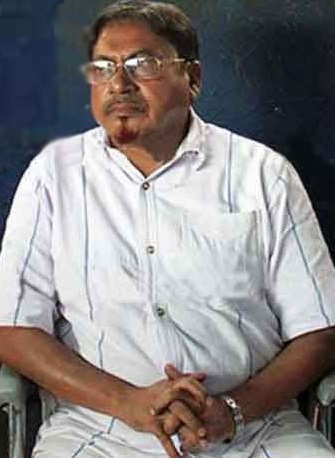
3. UN Human Rights Council Experts:
They criticized the retroactive laws and lack of an independent appeal system meeting global standards.
4. Prominent Legal Experts (UK, USA, Malaysia):
Several jurists, including former UN prosecutors, strongly criticized the tribunal. In their view, it functioned not as a neutral legal body but, rather, as a political tool. Furthermore, they argued that its procedures lacked transparency and failed to uphold international legal standards.
Many in Bangladesh’s civil society, media, and politics saw the ICT as political suppression against influential Jamaat-e-Islami leaders.
The Honesty and Exemplary Character of Shahid Muhammad Kamaruzzaman
Throughout history, true leadership has always been anchored in moral clarity and personal integrity. Honesty defined Shahid Muhammad Kamaruzzaman Khan’s life and work. From student leader to martyr, he stayed true to his principles, inspiring many with his simplicity and integrity.

